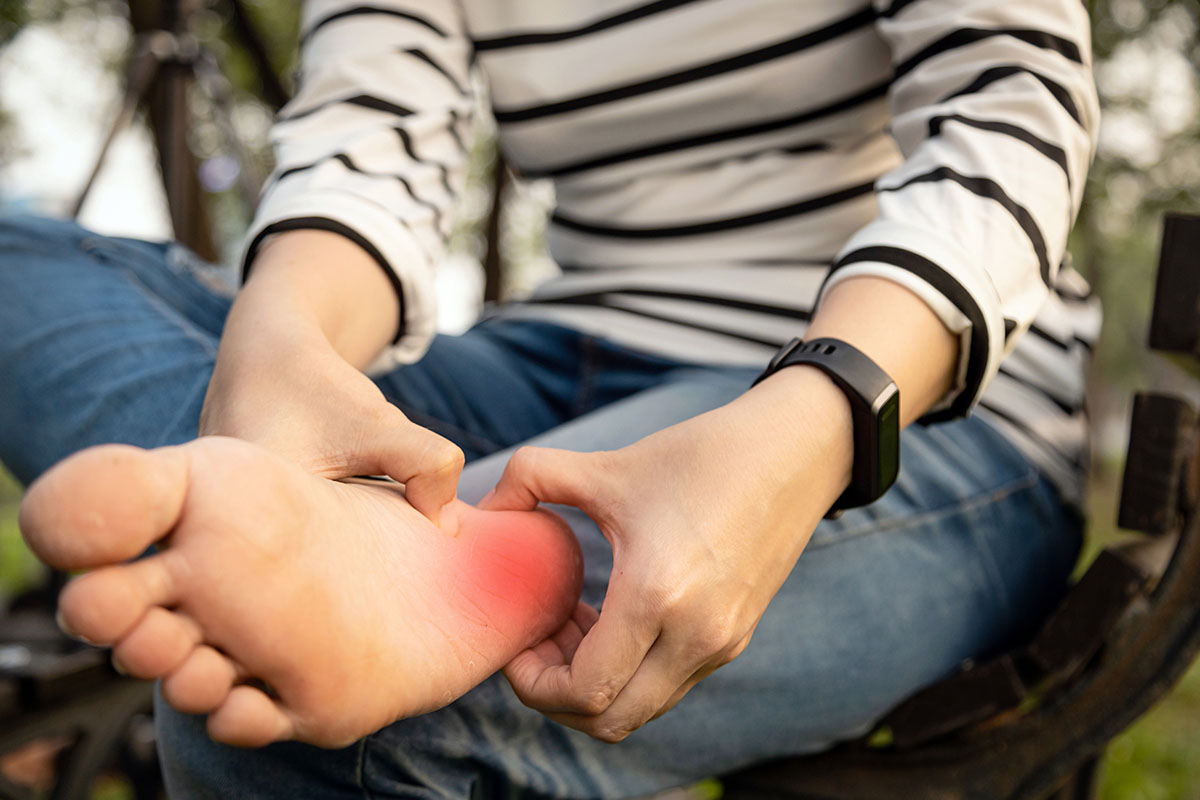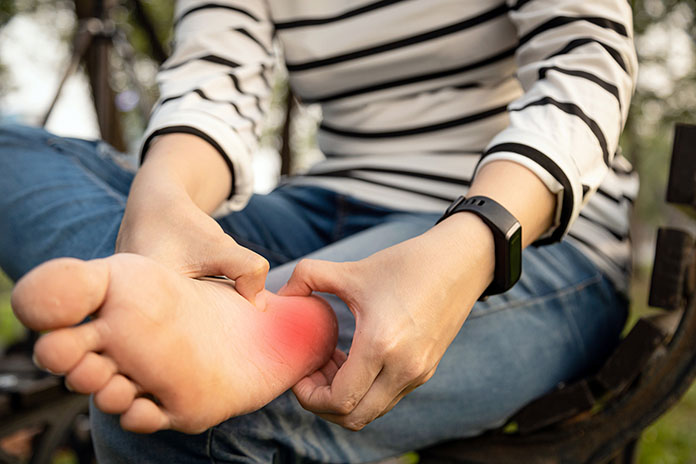
Your feet work really hard every day. They support you with every step you take; when you run, dance, or stand for any amount of time. Even though you don’t think much about it, you count on your feet all the time. Ironically, when your feet are hurting, you’re likely to think about the pain with every step you take. This is the nature of something called plantar fasciitis, where everything is fine until it’s not.
Plantar fasciitis is a common foot problem that involves pain and inflammation of the thick web-like band of tissue called the plantar fascia. Running from your heel bone to the just behind the base of your toes, the plantar fascia ligament is what supports the arch of your foot. It flexes with each step you take, acts as a shock absorber, and maintains the integrity of your arch. Plantar fasciitis occurs when the plantar fascia ligament is strained, becomes inflamed, or is injured.
The most common symptom of plantar fasciitis is pain, most frequently in front of your heel on the bottom of your foot, but it can occur anywhere along the ligament or at the base of your arch. Some people with plantar fasciitis describe the pain as stabbing, and others say that it feels like a deep ache. The pain is frequently at its worst with your first few steps in the morning or after you’ve been sitting for a while. It’s also aggravated by being on your feet for a long period of time. Unless you’ve had a direct injury, the symptoms of plantar fasciitis tend to develop slowly over time, and it can occur in one or both feet.
There are a number of factors that can make you prone to developing plantar fasciitis, including:
- A tight Achilles tendon. Your Achilles tendon is the thick band of tissue at the back of your ankle just above your heel. It attaches to the plantar fascia, and when your Achilles becomes tight, it also makes the plantar fascia tight, too.
- Tight calf muscles. The calf muscles at the back of your lower leg attach to your Achilles tendon, which attaches to the plantar fascia. Inflexible calf muscles are a common problem in people who develop plantar fasciitis.
- Standing, walking, or running on concrete and other hard surfaces for extended periods of time.
- High impact sports activities, such as running, basketball, soccer, or tennis.
- Working in an occupation in which you’re on your feet for long hours.
- Being overweight, which stresses the plantar fascia’s ability to support your arches.
- Shoes that don’t properly support your arches.
- Footwear that is worn out, especially athletic shoes.
- Your age; as you get older your ligaments and tendons become less flexible.
- If you pronate, which means that your feet tend to roll inward when you walk or run.
Your plantar fascia is a kind of connective tissue, and like all ligaments and tendons, it can take a long time to heal. The good news is that despite taking a frustratingly long time, plantar fasciitis will ultimately heal in most cases. It’s also good to know that there are some things that you can do to help the healing process.
Many people with plantar fasciitis have turned to acupuncture to relieve their symptoms and promote healing, and the research shows that this is a good idea. Scientists have found that acupuncture can be an effective treatment for plantar fasciitis because it releases chemicals that reduce pain and inflammation in the area. In addition, acupuncture increases blood flow, and promotes the circulation of fibroblasts, which are connective tissue cells important to the healing process. If you choose to have acupuncture to treat your plantar fasciitis, your practitioner may also incorporate electric stimulation, heat therapy, an herbal formula, or bodywork into their treatments for the best results.
There are some steps you can take on your own to help your plantar fasciitis heal. This includes resting your foot as much as possible. By doing so, you’re limiting the stretching and contracting of the plantar fascia that occurs with every step. Your choice of footwear also plays an important role. Replace worn out footwear, make sure your shoes have a good arch support, and don’t even think about flip flops or high heels. Flip flops offer no arch support, and high heels shorten your calf muscles, which can aggravate your plantar fasciitis. Instead, try to lengthen and loosen your calf muscles by stretching them daily.
Plantar fasciitis can be a frustrating condition, and it can feel like it will never heal. In addition, you’re reminded of how much your foot hurts with every step. However, in spite of how long the healing process takes, there are a number of things you can do to speed things along. My prescription for plantar fasciitis includes acupuncture, rest, really good shoes, and a little stretching.

Cindy Chamberlain is an acupuncturist in Overland Park, KS and the founder of Eastern Healing Solutions, LLC. She is licensed in Kansas and Missouri and has been practicing traditional Chinese medicine since 1996.


